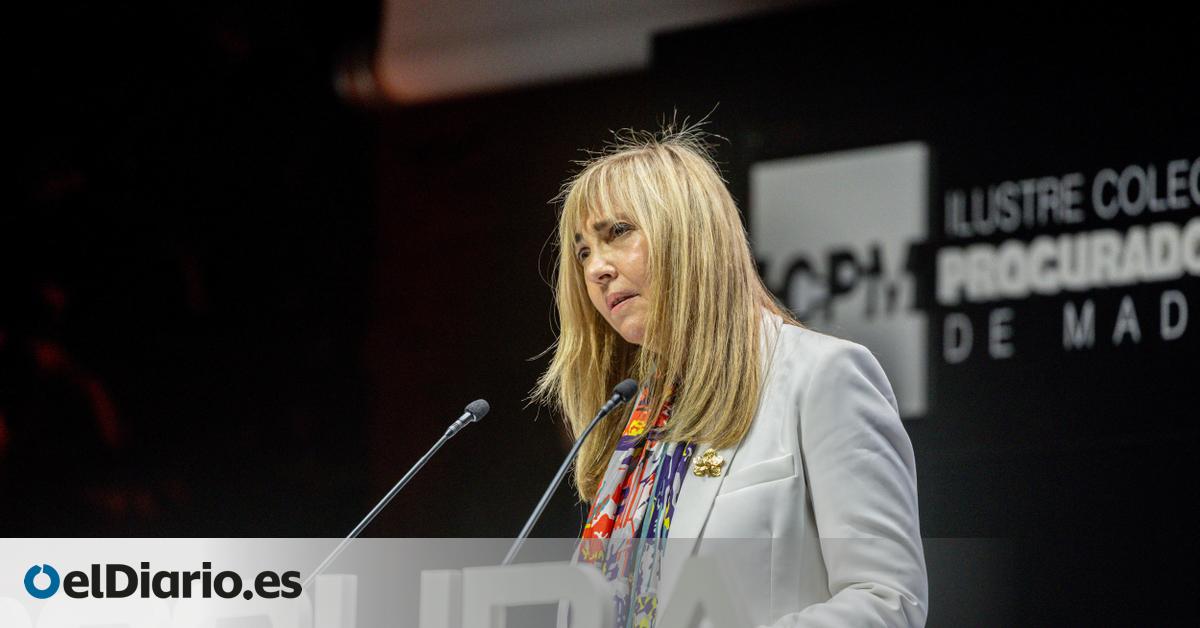
The precarious progressive majority with which the General Council of the Judiciary (CGPJ) was renewed last summer has failed to mitigate the conservative domain in the domes of the main courts. This is evidenced by the most appointments made during this first year of mandate. Magistrate Isabel Perelló, who took possession as president of the CGPJ just a year ago, promised in her first speech to make “with rigor, transparency and strictly respecting the principles of merit and capacity” the “huge work” that meant covering the hundred vacancies in the domes of the main court that had left the blockade of recent years.
Twelve months later, the balance of these designations shows that the Professional Association of the Magistracy (APM), conservative and majority in the race, has achieved 51 of the 134 designations, 38% of the total. It is almost double what the other three associations together have achieved. In addition, it has taken almost half of the promotions to the Supreme Court, which are especially relevant because they remain until retirement.
Judges and judges for democracy, progressive and third in number of associates, has placed 25 of its affiliates, 19% of the total adjudicated places. On the other hand, the non -associated judges, which suppose 42% of the judiciary, have made only one in four places, up to a total of 35. The Francisco de Vitoria association, second in number of affiliates, has accessed only eight (6%). And Independent Judicial Forum, fourth on behalf of three (just 2%).
The last plenary held before the summer break certified this trend. The conservative block pointed out one of the most important victories that he could aspire in this mandate by placing his candidates in the presidencies of the most delicate rooms of the Supreme Court: that of the criminal, which is the one that judges the Aforators; and that of the contentious-administrative, which is the one that reviews the resources against government decisions. Their designations occurred after the two applicants proposed by the progressive sector renounce their candidacies after being vetoed by the directors elected at the initiative of the Popular Party.
The agreement that took the CGPJ from the blockade after five years with the expired mandate divided the organ completely by half with ten progressive vowels and ten conservatives. To them is added the president, Isabel Perelló, to which a progressive sensitivity was attributed when she was chosen but has maintained a neutral position in the most controversial issues. The appointments require 13 votes and the vast majority of them have been achieved unanimously or for very comfortable majorities after agreements between both blocks, which negotiate in a commission with representatives of both groups.
The chosen vowel at the initiative of adding Carlos Hugo Preciado has unmarked about twenty. In a recent interview at Eldiario.es he was critical for the way in which these designations have been negotiated and pointed to possible failures in the strategy. The rest of the progressive block was also divided into the election of the presidencies of the two most sensitive rooms of the high court. Other vowels of this group admit that the balance on appointments is not positive, although they insist that their objective has always been to choose those candidates who accredit greater merit and capacity and that, on equal terms, they have opted for progressor aspiring progressive sensitivity.
The situation in the Supreme
The new distribution of the presidencies of the Supreme Court reflects a diversity of associative backgrounds. Ignacio Sancho, linked to the conservative APM, was chosen to preside over the Civil Chamber; Concepción Urente, of judges and judges for democracy (JJPD), is in charge of the Social Chamber; Andrés Martínez Arrieta, a member of the Francisco de Vitoria Judicial Association, has assumed the presidency of the Criminal Chamber; and Pablo Lucas, not affiliated, presides over the contentious-administrative room. They are mandates that have a duration of five years, although in the case of Martínez Arrieta and Lucas they will not fulfill them because they will reach the forced retirement age, 72 years, in April 2027 the first and in July 2026 the second.
More relevant, if possible, are the rest of promotions to the Supreme because, except resignation, they remain until retirement. And there the APM has accessed almost half of the designated positions: 10 of 23. In addition, in the last plenary session it was also promoted to this Chamber Antonio Narváez. Conservative ex -speech of the Constitutional Court, he was one of the prosecutors who came to express his desire that Alberto Núñez Feijóo arrived at the Government, he reported The country. Narváez is a fiscal and entered the so -called jurist.
Seven magistrates of the Progressive Association and two of the Francisco de Vitoria have also been located in the high court. Of all those named that accessed by court only four are not linked to any association.
Especially striking is the situation of the National Court, where an overwhelming majority of releases of the PP and other conservative judges in the race opted for their key positions. Finally, of the five renewed positions three have been for candids of the APM, including its president, Juan Manuel Fernández, who during the previous mandate was a member of the CGPJ at the proposal of the PP. In addition, the Criminal Chamber will be presided over by veteran Alfonso Guevara, a magistrate considered conservative who is not associated.
Since last February the presidencies of 13 superior regional courts have also been renewed and in nine they were elected judges linked to the APM: Aragon, Asturias, Castilla-La Mancha, Valencian Community, Extremadura, Galicia, La Rioja, Madrid and Murcia. Five of them were unique candidates. In addition, a progressive president for the TSJ of Catalonia and another linked to the Francisco de Vitoria in Andalusia, who faces his third term at the head of that court.
34 presidents of the different rooms of the Autonomous Superior Courts have also been appointed. Practically half, a total of 16, are not linked to any association. Nine are affiliated with the conservative. Among them is the case of Carmen Romero, who was appointed president of the Contentious-Administrative Chamber of the Superior Court of Justice of Extremadura even though he had no experience in collegiate bodies. The other candidate for that position was the magistrate Raimundo Prado, who has been part of that room for more than a decade. Prado was spokesman for the Francisco de Vitoria association.
On the other hand, of the 43 presidencies of provincial hearings that have been renewed, 19 have become occupied by judges of the conservative association over the next five years, which is the duration of this type of governmental positions. This is the case of A Coruña, Albacete, Alicante, Araba-álava, Ávila, Asturias, Barcelona, Burgos, Castellón, Córdoba, Huelva, Jaén, La Rioja, Madrid, Pontevedra, Sevilla, Teruel, Toledo and Valladolid. The vowels elected conservative candidates despite the fact that in 12 of the cases there were other candidates. The remaining seven were unique aspiring.
In addition, there will be progressive presidents in a dozen provincial audiences. This is the case of Girona, Las Palmas, Lugo, Málaga, Murcia, Palencia, Soria, Valencia, Zaragoza, and Zamora. On the other hand, the presidents of the Balearic and Tenerife audiences are linked to Francisco de Vitoria and Huesca to Independent Judicial Forum.
“Chromos exchange”
Precisely these associations, whose affiliates barely access these discretionary designation positions, which are most critical of the CGPJ appointments policy, which has seven members linked to the APM and four of judges and judges for democracy among its vowels.
“There has been an exchange of chromes between the two associations that have a presence in the Council. The appearance is that the criterion that most cousin is the ascription to one of those two associations. Excellent magistrates is being thrown out of the main term who with incontestable merit and capacity do not have the possibility of competing in equal people with people attached to those association Vitoria
Oliva defends that it is necessary that a reform be carried out around the appointments aimed at achieving an “objective” system and that allows “scrub” the curriculums and experience. “It is true that the appointments are discretionary, but now they touch arbitrariness,” he adds.
Judge Fernando Portillo, president of the Independent Judicial Forum, believes that the appointment policy of the current Council is “as bad” as that of the previous mandate because, in his opinion, the designations are based on “ideological, associative or personal affinities” and not in criteria of “merit and capacity.”
“That many appointments have been carried out unanimously is the finding that there has been a concert between the parties instead of discussing each candidacy individually. It is not that more magistrates of FJI or Francisco de Vitoria be named, but that the best is named for a procedure that is clear,” he says.
Edmundo Rodríguez, spokesman for judges and judges for democracy, affirms, on the other hand, that although it is common for the issue of appointments to generate “dissatisfaction”, it stands out as a positive aspect that except for the Supreme Chambers of the Supreme Parity is being respected. It is, in his opinion, something that “should be an inalienable objective of this CGPJ to ensure that in the future it is an irreversible conquest.”
The opening of the judicial year
It is in this context that the Supreme Court hosts this Friday the solemn act of opening of the judicial year, an appointment to which King Felipe VI goes and that gives the gun of departure to the new course in the courts after the summer break. The appointment will be marked on this occasion by the situation in which the attorney general, Álvaro García Ortiz, is processed by the alleged filtration of an email from Isabel Díaz Ayuso. And also for the words of the President of the Government, Pedro Sánchez, in the interview he granted on Monday to TVE, where he assured that “there are judges doing politics and do immense damage to justice.”
After attending in recent years, the leader of the PP, Alberto Núñez Feijóo, said Wednesday that he will not go to the inauguration of the judicial year “for a previously acquired commitment”: a rally of President Ayuso. However, the same statement, the PP accused the executive of “tensioning” the king for making him “share an act” with a prosecuted attorney.
Source: www.eldiario.es

